
Edward George Earle Lytton Bulwer-Lytton, 1st Baron Lytton, PC was an English writer and politician. He served as a Whig member of Parliament from 1831 to 1841 and a Conservative from 1851 to 1866. He was Secretary of State for the Colonies from June 1858 to June 1859, choosing Richard Clement Moody as founder of British Columbia. He declined the Crown of Greece in 1862 after King Otto abdicated. He was created Baron Lytton of Knebworth in 1866.
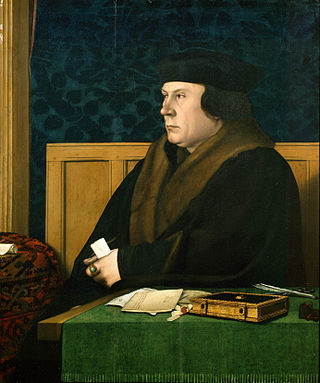
Thomas Cromwell, briefly Earl of Essex, was an English lawyer and statesman who served as chief minister to King Henry VIII from 1534 to 1540, when he was beheaded on orders of the king, who later blamed false charges for the execution.

Reginald Pole was an English cardinal of the Catholic Church and the last Catholic archbishop of Canterbury, holding the office from 1556 to 1558, during the Counter-Reformation.

Armand Jean du Plessis, Duke of Richelieu, known as Cardinal Richelieu, was a French statesman and clergyman. He was also known as l'Éminence rouge, or "the Red Eminence", a term derived from the title "Eminence" applied to cardinals and the red robes that they customarily wear.
This article contains information about the literary events and publications of 1798.

Sir Henry Irving, christened John Henry Brodribb, sometimes known as J. H. Irving, was an English stage actor in the Victorian era, known as an actor-manager because he took complete responsibility for season after season at the West End’s Lyceum Theatre, establishing himself and his company as representative of English classical theatre. In 1895 he became the first actor to be awarded a knighthood, indicating full acceptance into the higher circles of British society.

William Charles Macready was an English stage actor.
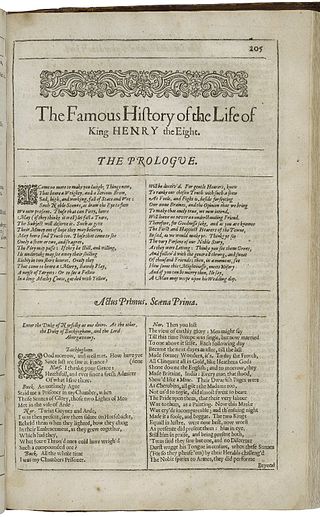
Henry VIII is a collaborative history play, written by William Shakespeare and John Fletcher, based on the life of Henry VIII. An alternative title, All Is True, is recorded in contemporary documents, with the title Henry VIII not appearing until the play's publication in the First Folio of 1623. Stylistic evidence indicates that individual scenes were written by either Shakespeare or his collaborator and successor, John Fletcher. It is also somewhat characteristic of the late romances in its structure. It is noted for having more stage directions than any of Shakespeare's other plays.
The Exeter Conspiracy in 1538 was a supposed attempt to overthrow Henry VIII, who had taken control of the Church of England away from the Pope, and replace him with Henry Courtenay, 1st Marquess of Exeter, who was a first cousin of the King.
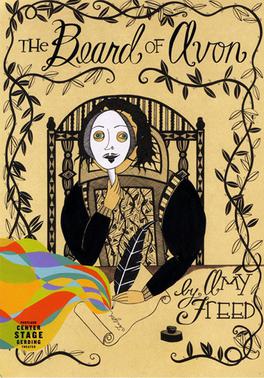
The Beard of Avon is a play by Amy Freed, originally commissioned and produced by South Coast Repertory in 2001. It is a farcical treatment of the Oxfordian theory of Shakespeare authorship, in which both Shakespeare and his wife become involved, in different ways, with secret playwright Edward de Vere and find themselves helping to present the works of several other secretive authors under Shakespeare's name, including Queen Elizabeth I herself.
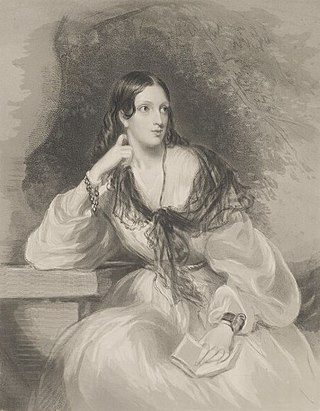
Lady Emmeline Charlotte Elizabeth Stuart-Wortley was an English poet and writer, best known for her Travels in the United States, etc. During 1849 and 1850. She was editor of The Keepsake volumes for 1837 and 1840.
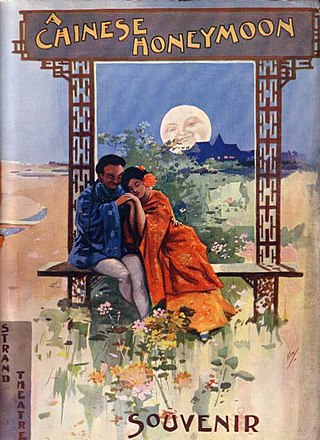
The Royal Strand Theatre was located in the Strand in the City of Westminster. The theatre was built on the site of a panorama in 1832, and in 1882 was rebuilt by the prolific theatre architect Charles J. Phipps. It was demolished in 1905 to make way for Aldwych tube station.
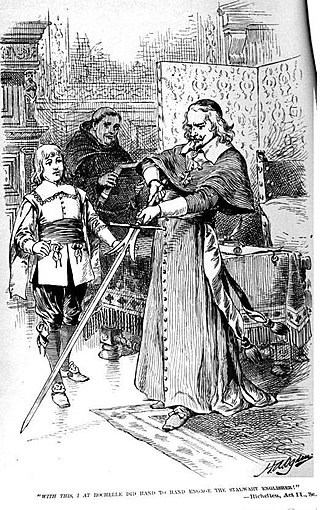
"The pen is mightier than the sword" is a metonymic adage, created by English author Edward Bulwer-Lytton in 1839, indicating that the written word is more effective than violence as a means of social or political change.
Mary, Mary is a play by Jean Kerr. After two previews, the Broadway production opened on March 8, 1961, at the original Helen Hayes Theatre, where it ran for nearly three years and nine months before transferring to the Morosco, where it closed on December 12, 1964, after 1572 performances, making it the longest-running non-musical Broadway play of the 1960s.
Edward William Elton was an English actor.
Edward Lanzer Joseph was a journalist, playwright and novelist who emigrated to Trinidad in 1817. Joseph was of Anglo-Jewish descent.
The Massacre of Paris is a 1689 tragedy by the English writer Nathaniel Lee. It was first staged by the United Company at the Theatre Royal, Drury Lane. It is based around the 1572 St. Bartholomew's Day massacre which led the killing of many Huguenots during the French Wars of Religion. The events had previously been portrayed in Christopher Marlowe's Elizabethan play The Massacre at Paris.
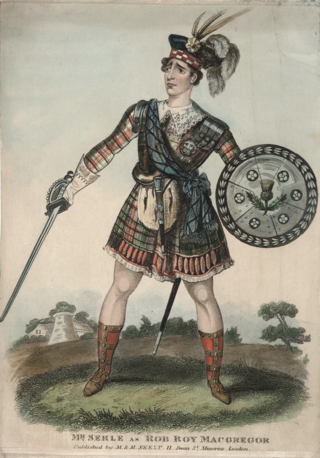
Thomas James Serle (1798–1889) was an English dramatist and actor. He was also a journalist with the Weekly Dispatch.

Master Clarke is an 1840 historical play by the British writer Thomas James Serle. It premiered at the Theatre Royal, Haymarket on 26 September 1840. It revolves around the life of Richard Cromwell, deposed Lord Protector of England, during the seventeenth century.The original cast included William Macready as Richard Cromwell, Benjamin Nottingham Webster as Charles II, Samuel Phelps as General Lord Disbrowe, Walter Lacy as Ingoldsby, Henry Howe as Sir Richard Willis, William Henry Oxberry as Smoothly, George John Bennett as Captain Darnel and Helena Faucit as Lady Dorothy Cromwell. The play was not a great success, partly due to the fact that Macready had not properly learned the part which was to be a growing problem for him.

The French Libertine is an 1826 historical play by the British-based American writer John Howard Payne. Written under the title Richelieu the play originally focused on the life of the eighteenth century French aristocrat and libertine the Duke of Richelieu, a relation of the seventeenth century statesman Cardinal Richelieu. It was partly inspired by the 1796 work La Jeunesse de Richelieu by Alexandre Duval. Issues with the censor George Colman led to many changes, done by Charles Kemble who played the lead, and Richelieu was altered into the fictional Duke de Rougemont.















